Ethics and Morality
The Truth About Medical PR
A textbook case on medical ethics.
Posted November 14, 2019 Reviewed by Lybi Ma

The latest issue of the Journal of Scientific Practice and Integrity includes a detailed, well-documented exposé of ghostwriting and fabricated data in academic psychiatry.
The case involves newly posted documents cited in litigation that show comprehensive evidence of ghostwriting that “manipulated outcome data,” named authors with financial ties to the drug maker sponsoring the article, but with “little or no direct involvement” in the study to which they lent their names, and publication in the flagship American Journal of Psychiatry being “facilitated by the journal editor who also had financial ties to” the sponsoring pharmaceutical company.
The coauthors of the JSPI article, Jay D. Amsterdam (Psychiatry, University of Pennsylvania) and Leemon B. McHenry (Philosophy, California State University-Northridge), show that GlaxoSmithKline partnered with Scientific Therapeutics Information, Inc. (STI), a medical PR company, to place ghostwritten articles in prominent academic psychiatry journals. With “Double-Blind, Placebo-Controlled Comparison of Imipramine and Paroxetine in the Treatment of Bipolar Depression,” they succeeded. The article appeared in AJP in June 2001 and appeals to the editor to retract it have so far been ignored.
The JSPI article began as a formal investigation by the University of Pennsylvania’s Perelman School of Medicine, initiated after a complaint of scientific misconduct was filed in July 2011 with the Office of Research Integrity at the Department of Health and Human Services.
This is not the first time GSK has been accused of suppressing negative data or sponsoring ghostwritten articles to spin preferred narratives. In 1998, the drug maker drew up internal memos instructing staff on how to withhold or mask negative results, directives that led to litigation and widespread criticism. Nevertheless, in April 2000, the drugmaker launched a ghostwriting service for prominent academics called Case Study Publications for Peer Review (CASPPER), which “budgeted for 50 articles in 2000” alone and presented itself as a service leading to “the timely publication of responses to unbalanced information from competitors.”
“There are some data that no amount of spin will fix,” complained Sally K. Laden, whom Amsterdam and McHenry describe as “one of the most prolific ghostwriters” hired at now-defunct STI. Laden was writing to GSK managers about the problem of presenting underwhelming data in ways the drugmaker would still favor. As a practice, she would secure leading authors through flattery and promised convenience: “We are pleased to invite you to participate as an author on this article. Enclosed, please find Draft II of the manuscript for your review.” “We love working with you!” is just one of the responses she is quoted as receiving.
According to Amsterdam and McHenry, Laden was the chief architect of numerous ghostwritten articles, including the now-notorious Paroxetine 329 Adolescent Depression Trial, the Paroxetine 352 Bipolar Depression Trial, and a special issue of Psychopharmacology Bulletin entitled "Advancing the Treatment of Mood and Anxiety Disorders: The First 10 Years’ Experience with Paroxetine." Though in print she is credited only with “editorial assistance,” the online journal submission of the Paroxetine 352 Bipolar Study represents her as “sufficiently involved in this work to take public responsibility for its validity and final presentation as an original publication.”
A subpoena from 2008, tied to the case of Burdick vs. GSK, netted these and many other documents, enabling Amsterdam and McHenry to reconstruct the drafting and revisions in such detail that they can date the insertion of falsified claims and conclusions, as well as who was responsible for them. GSK’s handwritten revisions, we learn, helped to turn a standard “comparable in efficacy” statement about paroxetine (Paxil) and imipramine (Tofranil) into one asserting that the former drug, which GSK manufactures, “showed statistically significant superiority to placebo in patients maintained on low lithium levels.” The published conclusion remains: “In those patients receiving active drug who had low lithium serum levels, a pronounced therapeutic effect was demonstrated with imipramine and paroxetine, and significant differences from placebo were seen.”
Because of poor subject enrollment, Paroxetine Study 352 was, in fact, a “noninformative trial with insufficient statistical power to show anything other than inconclusive results.” Amsterdam and McHenry contend that it actually demonstrated “no evidence of paroxetine or imipramine efficacy versus placebo in bipolar major depression.”
The controversy is not entirely lacking in bright spots. One AJP reviewer rejected the revised manuscript, even after elaborate changes, instead “recommend[ing] additional analyses, revisions, and the elimination of all commercial bias.” Feedback on an earlier draft had been blunt and critical: “The paper still has a very biased tinge to it.” Execs at GSK were nonetheless enraged by the mounting costs and delays, conveying that frustration through their intermediary, the ghostwriting agency, which noted: “They don’t care where it is published, they just don’t want to be charged extra.”
Why the episode matters is best summed up by Amsterdam and McHenry: “The integrity of science depends on the trust placed in individual clinicians and researchers and in the peer-review system which is the foundation of a reliable body of knowledge…. Ghostwriting is a serious problem, because it... disguises marketing and public relations objectives of for-profit companies as science, conceals conflicts of interest of named ‘authors’ on manuscripts, misrepresents the results of scientific testing, and, most important, has contributed to fatal consequences in cases in which the safety of drugs are misreported.”
References
Amsterdam, JD, and McHenry, LB. Nov. 2019. “The Paroxetine 352 Bipolar Study Revisited: Deconstruction of Corporate and Academic Misconduct.” Journal of Scientific Practice and Integrity 1.1:1-12: DOI: 10.35122/jospi.2019.958452 [Link]
Jureidinia, JN, Amsterdam, JD, and McHenry, LB. 2016. “The citalopram CIT-MD-18 pediatric depression trial: Deconstruction of medical ghostwriting, data mischaracterisation and academic malfeasance.” International Journal of Risk & Safety in Medicine 28: 33–43. DOI 10.3233/JRS-160671 [Link]
Nemeroff, CB, Evans, DL, and Gyulai, L, et al. 2001. “Double-Blind, Placebo-Controlled Comparison of Imipramine and Paroxetine in the Treatment of Bipolar Depression.” Am J Psychiatry 158.6:906-12 [Link]


